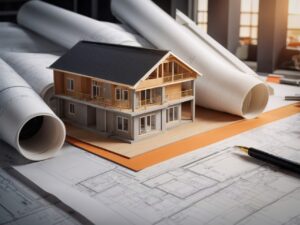So you’ve made the exciting decision to build your dream home, and now you’re ready to take the next step and sign a contract with a new home builder. But before you put pen to paper, it’s essential to have a clear understanding of the information that these builders are obligated to provide you with. This article explores the vital details that you, as a consumer, should know before signing a contract with a new home builder. From disclosure requirements to warranty information, we’ll cover everything you need to ensure a smooth and informed home-building experience.

Disclosure of Builder Information
Legal Name of the Builder
Before you sign a contract with a new home builder, it is important to have all the necessary information about the builder in order to make an informed decision. One crucial piece of information that the builder must disclose is their legal name. This ensures that you are dealing with a reputable and legitimate builder, as you have the right to know who you are entering into a contract with.
Contact Information of the Builder
In addition to the legal name, the builder is also required to provide their contact information. This includes their phone number, email address, and physical address. Having this information readily available allows for easy communication between you and the builder throughout the construction process. It also gives you peace of mind knowing that you have multiple ways to reach out to them if needed.
Builder’s License and Certification
Another important aspect of the builder’s disclosure is their license and certification information. It is essential to ensure that the builder holds all the necessary licenses and certifications required by local and state authorities. This confirms that they have met the required standards and regulations for building homes. By providing this information, the builder demonstrates their commitment to professionalism and adherence to legal requirements.
Insurance Information
An important consideration when choosing a new home builder is their insurance coverage. Builders are required to disclose their insurance information, including liability insurance. This protects both you and the builder in the event of any accidents or damages that may occur during the construction process. It is crucial to confirm that the builder has sufficient insurance coverage to provide you with peace of mind and protection.
References and Past Projects
To gain a deeper understanding of the builder’s capabilities and reputation, it is essential to request references and information about their past projects. A reputable builder will gladly provide you with a list of satisfied customers who can give you insights into the builder’s workmanship, professionalism, and overall experience. Additionally, examining the builder’s past projects allows you to assess the quality of their work and determine whether it aligns with your vision for your new home.
Detailed Description of the Home
Floor Plan and Layout
Understanding the floor plan and layout of your future home is crucial for envisioning how the space will function and meet your needs. The builder should provide you with a detailed floor plan that includes measurements, the locations of rooms, windows, doors, and other essential features. This information allows you to assess the flow of the house, identify potential areas for customization, and ensure that the design meets your preferences.
Building Materials and Construction Methods
The materials used in the construction of your home play a significant role in its quality, durability, and overall aesthetics. The builder should provide detailed information about the building materials that will be used, including the type of lumber, roofing materials, insulation, and flooring options. Additionally, understanding the construction methods employed by the builder can give you confidence in the structural integrity of your home.
Energy Efficiency Features
With the growing emphasis on energy efficiency, it is important to inquire about the energy-saving features included in the construction of your home. The builder should disclose details about insulation, energy-efficient windows, heating and cooling systems, and other energy-saving measures. This information allows you to assess the long-term cost savings and environmental impact of your new home.
Appliances and Fixtures
The builder should provide information about the appliances and fixtures included in the home. This may include details about the brand, model, and any warranties or guarantees associated with these items. Having this information beforehand allows you to plan for any desired upgrades or modifications and ensures that you have the necessary knowledge about the quality and functionality of these essential components of your home.
Landscaping and Outdoor Features
The builder should also disclose information about any landscaping or outdoor features included in the construction of your home. This may include details about the type of plants, trees, and grass that will be installed, as well as any outdoor amenities like patios, decks, or swimming pools. Understanding these features helps you visualize your future outdoor living spaces and plan for any additional landscaping or customization you may desire.
Pricing and Payment Terms
Total Cost of the Home
One of the most crucial aspects of a new home construction project is understanding the total cost of the home. The builder should provide a clear and detailed breakdown of the total cost, including all applicable taxes and fees. This ensures that you have a comprehensive understanding of the financial commitment you are making and can plan accordingly.
Itemized Breakdown of Costs
In addition to the total cost, the builder should also provide an itemized breakdown of costs. This includes details of each individual expense, such as the cost of materials, labor, permits, landscaping, and any customization or upgrades. Having an itemized breakdown allows you to understand how the total cost is allocated and make informed decisions about where you may want to make adjustments or negotiate.
Payment Schedule
Understanding the payment schedule is critical to ensure that both parties are clear on the terms of payment throughout the construction process. The builder should provide a detailed payment schedule that outlines when and how much you will be required to pay at each stage of construction. It is important to review these terms carefully to avoid any surprises and ensure that you are financially prepared to fulfill your payment obligations.
Penalties or Additional Fees
In the event of changes or delays in the construction process, it is important to note any penalties or additional fees that may be incurred. The builder should disclose any circumstances that may result in additional costs or fees, such as modifications to the original plans or requested changes after construction has commenced. Understanding these potential fees allows you to plan accordingly and avoid any unnecessary financial burdens.
Options for Financing
If you require financing to fund your new home construction, it is important to discuss and understand the available options. The builder should provide information about preferred lenders or financing programs that they work with. Additionally, they should be transparent about any potential incentives or discounts that may be available when financing through their recommended sources. Being aware of these options allows you to explore different financing strategies and select the option that best suits your needs.
Construction Timeline
Expected Start and Completion Dates
Having a clear understanding of the expected start and completion dates for your new home construction project is essential. The builder should provide you with specific timelines that outline when construction is expected to begin and when it is anticipated to be completed. This allows you to plan your move and make any necessary arrangements accordingly.
Possible Delays and Extensions
While builders strive to adhere to the agreed-upon timeline, it is important to acknowledge that there may be unforeseen circumstances that can cause delays or require extensions. The builder should disclose any possible causes of delay, such as inclement weather or issues with the supply chain. By being aware of potential delays upfront, you can set realistic expectations and plan accordingly.
Inspection and Quality Assurance Process
To ensure that your new home meets the highest standards of quality and is free from defects, the builder should explain their inspection and quality assurance process. This includes details about when and how inspections will be conducted throughout the construction process. Understanding the quality checks and assurance measures in place gives you confidence in the builder’s commitment to delivering a well-built home.
Communication Plan with Builder
Open and effective communication between you and the builder is key to a successful construction project. The builder should establish a communication plan that outlines how and when they will provide updates on the progress of your home’s construction. This may include regular meetings, email updates, or other forms of communication. By establishing clear communication channels from the beginning, you can stay informed and actively participate in the construction process.
Warranty and Maintenance Period
The builder should provide detailed information about the warranty and maintenance period for your new home. This includes the length of the warranty, what it covers, and any exclusions. It is important to understand what recourse you have if any issues arise after moving into your home. Additionally, the builder should explain the maintenance responsibilities that will be expected of you as the homeowner.

Homeowner Protection and Warranty
Builder’s Warranty Coverage
Understanding the extent of the builder’s warranty coverage is crucial for your peace of mind. The builder should explain the specific items and systems that are covered under the warranty, as well as the duration of coverage. This ensures that you are aware of the builder’s commitment to resolving any issues that may arise within the specified warranty period.
Manufacturer and Supplier Warranties
In addition to the builder’s warranty, it is important to inquire about any warranties provided by manufacturers or suppliers of materials used in the construction of your home. This can include warranties for appliances, fixtures, or any other components of your home. Knowing the details of these warranties allows you to understand your rights and recourse in the event of defects or malfunctions.
Homeowner’s Responsibility for Maintenance
As a homeowner, it is essential to understand your responsibilities for maintaining your new home. The builder should provide clear guidelines on the maintenance tasks that you will be responsible for, such as regular cleaning, replacing filters, and scheduling inspections. Understanding these responsibilities ensures that you can properly care for your home and protect your investment.
Processes for Reporting and Resolving Defects
In the unfortunate event that defects or issues arise with your newly constructed home, the builder should outline the processes for reporting and resolving these problems. This includes information on how to communicate the issues to the builder, the expected timelines for resolution, and any necessary documentation or evidence that may be required. Having a clear process in place ensures that any defects are addressed promptly and efficiently.
Dispute Resolution Options
In the event of a dispute between you and the builder, it is important to understand the available options for resolving the conflict. The builder should disclose the dispute resolution methods that they utilize, such as mediation or arbitration. This information allows you to make an informed decision about how potential disputes will be resolved and can provide reassurance that the builder is committed to fair and effective conflict resolution.
Rights and Responsibilities
Builder’s Responsibilities for Building Standards
The builder has specific responsibilities for ensuring that your new home meets the required building standards and codes. These responsibilities should be clearly defined and disclosed in the contract. The builder’s commitment to adhering to the highest standards of construction ensures that your new home will be safe, structurally sound, and compliant with all relevant regulations.
Homeowner’s Responsibilities for Maintenance
As a homeowner, it is important to understand your responsibilities for maintaining your new home. This includes regular upkeep, maintenance, and coordinating any necessary repairs. Understanding and fulfilling these responsibilities ensures the longevity and proper functioning of your home.
Rights to Request Changes or Upgrades
During the construction process, you may have specific changes or upgrades you would like to request. The builder should outline your rights to request these modifications and provide information on any associated costs or timelines. It is essential to understand the process for requesting changes or upgrades to ensure that your vision for your new home is incorporated into the construction.
Right to Inspections and Walk-throughs
Inspecting your new home during the construction process is an important right that allows you to monitor progress, identify any potential issues, and ensure that the construction aligns with your expectations. The builder should provide details on when and how you can conduct inspections and walk-throughs, as well as any guidelines or restrictions in place. This empowers you to actively participate in the construction process and make necessary adjustments or corrections as needed.
Responsibilities for Taxes and Insurance
It is important to be aware of your responsibilities for taxes and insurance once you become the owner of your new home. The builder should provide information about any taxes or fees that you will be responsible for upon completion of the construction. Additionally, they should explain the timing and requirements for obtaining homeowner’s insurance coverage to protect your investment.

Contract Terms and Conditions
Clear and Specific Contract Language
When entering into a contract with a new home builder, it is crucial to ensure that the contract language is clear, specific, and easy to understand. The contract should outline all the agreed-upon terms and conditions, leaving no room for confusion or misinterpretation. It is important to review the contract carefully and seek clarification on any clauses or provisions that may be unclear.
Legal Requirements and Disclosures
The contract should also include all legal requirements and necessary disclosures, ensuring compliance with local, state, and federal laws. This includes any required information about warranties, inspections, safety measures, and disclosure of potential hazards. By including these legal requirements and disclosures in the contract, both you and the builder can operate within the boundaries of the law.
Cancellation and Termination Policies
Unforeseen circumstances may arise that require you to cancel or terminate the contract. The builder should clearly state the cancellation and termination policies, including any potential fees or penalties that may be incurred. Understanding these policies before signing the contract allows you to plan for any potential changes in your circumstances and make an informed decision.
Arbitration and Mediation Clauses
In the event of a dispute, the contract should outline the options for arbitration or mediation as a means of resolving conflicts. These alternative dispute resolution methods can help avoid costly and time-consuming legal battles. Understanding the arbitration and mediation clauses in the contract ensures that you have a clear understanding of the potential paths for resolving disputes.
Compliance with Building Codes and Regulations
The contract should emphasize the builder’s commitment to compliance with all relevant building codes and regulations. This ensures that your new home will be built to the highest standards and in accordance with all legal requirements. The contract should clearly state that the builder will obtain all necessary permits and approvals as required by local and state authorities.
Safety and Insurance
Safety Measures during Construction
Safety should be a top priority during the construction process. The builder should disclose the safety measures that will be implemented on the construction site, including the use of personal protective equipment, site security measures, and the presence of any hazards. This information ensures that everyone involved in the construction process, including the workers and future homeowners, is protected and can work in a safe environment.
Builder’s Liability Insurance
Builders are required to have liability insurance to protect themselves and the homeowner in case of accidents or damages that may occur during construction. The builder should provide information on their liability insurance coverage and the limits of liability. This gives you peace of mind knowing that you are protected in the event of any unforeseen incidents.
Homeowner’s Insurance Requirements
As the homeowner, it is essential to have adequate insurance coverage to protect your investment and personal belongings. The builder should inform you of any specific insurance requirements that you need to fulfill before taking possession of your new home. This ensures that you are properly insured against potential risks and that you are compliant with any contractual obligations.
Inspection for Compliance with Safety Standards
Before taking possession of your new home, it is important to ensure that it meets all safety standards and regulations. The builder should arrange for a final inspection to confirm compliance with these standards and provide you with the necessary documentation. This ensures that your home is safe and that it meets all the required safety protocols.
Rights to Request Proof of Insurance
As the homeowner, you have every right to request proof of insurance from the builder, both for the builders themselves and any subcontractors involved in the construction process. This allows you to verify that all parties have the necessary insurance coverage to protect against any potential liabilities. Requesting proof of insurance is a proactive measure to ensure that you and your investment are adequately protected.

Disclaimers and Disclosures
Disclosures of Potential Risks or Hazards
The builder should disclose any potential risks or hazards associated with the construction or location of your new home. This may include information about potential environmental factors, such as flood zones or seismic activity, or any specific risks associated with the materials used in construction. Being aware of these risks allows you to make informed decisions and take appropriate measures to mitigate any potential hazards.
Any Known Defects or Issues with the Property
Prior to entering into a contract, the builder should disclose any known defects or issues with the property. This ensures transparency and allows you to make an informed decision about whether to proceed with the construction. Understanding any existing defects or issues allows you to plan accordingly and consider potential solutions or adjustments.
Disclaimers about Future Changes or Developments
The builder should disclose any information about future changes or developments that may impact the property or surrounding area. This includes any planned construction or infrastructure projects that may affect the value or livability of your new home. Being informed about these potential changes allows you to make decisions based on a comprehensive understanding of the future landscape.
Disclaimer of Builder’s Liability for Unforeseen Circumstances
The builder should include a disclaimer stating that they are not responsible for any unforeseen circumstances or events that may occur during or after the construction process. This protects the builder from liability for natural disasters, acts of nature, or other events beyond their control. It is important to understand these disclaimers and ensure that you have appropriate insurance coverage to protect against such events.
Rights to Request Additional Disclosures
As a consumer, you have the right to request additional disclosures from the builder if you feel that there is any missing or incomplete information. The builder should be transparent and willing to provide any additional disclosures that you request. This ensures that you have a comprehensive understanding of all relevant information before signing the contract.
Contract Review and Legal Advice
Importance of Reviewing the Contract
Before signing the contract with the builder, it is essential to thoroughly review all its terms and conditions. The contract is a legally binding agreement between you and the builder, and it is crucial to ensure that you fully understand your rights and obligations before committing. Taking the time to review the contract protects you from unforeseen issues and ensures that both parties are on the same page.
Opportunity to Seek Legal Advice
While reviewing the contract, it is always a good idea to seek legal advice from a qualified professional, such as a real estate attorney. They can provide guidance and ensure that you fully understand the implications of the contract’s terms and conditions. Legal advice helps safeguard your interests and ensures that your rights are protected throughout the construction process.
Understanding Rights and Obligations
Reviewing the contract and seeking legal advice allows you to fully understand your rights and obligations as outlined in the contract. This includes understanding the timelines for completion, payment terms, dispute resolution methods, and warranty coverage. Understanding these rights and obligations enables you to make informed decisions and navigate the construction process with confidence.
Modifications or Customization Requests
If you have any modifications or customization requests, it is essential to ensure that they are properly documented in the contract. This includes specific details about the desired changes, any associated costs, and timelines for completion. Having these modifications or customization requests included in the contract prevents any misunderstandings or disputes later on and ensures that your vision for your new home is accurately reflected.
Signing the Contract
Once you have thoroughly reviewed the contract, sought legal advice, and are satisfied with the terms and conditions, it is time to sign the contract. By signing the contract, you are formally entering into a binding agreement with the builder. It is important to keep a copy of the signed contract for your records and to refer back to it throughout the construction process if any issues or questions arise.




